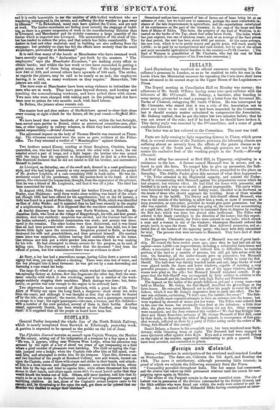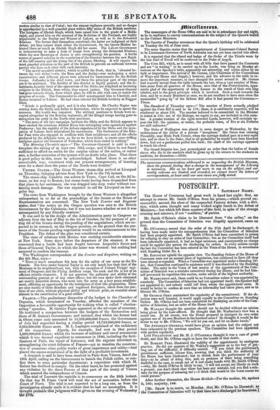gorcion an Colonial.
INDIA.—Despatches in anticipation of the overland mail reached London on Wednesday. The dates are, Calcutta the 7th April, and Bombay the 15th. The news is satisfactory, although possessing little interest; in pined of which we subjoin the following summary from the Times.
" Tranquillity prevailed throughout India. The hot season had commenced, and the armies had takerrup their permanent stations until the season for cam-
paigning opens again, in October. • The affairs of the Punjaab remain in the same unsettled state. The city of Lahore was in possession of the division commanded by the British General, and the Sikh soldiers who were found out within the walls were ordered to quit in- stantly. An idea existed of the disbanded Sikhs having contemplated an inter-
rection similar to that of Cabal; but the utmost vigilance prevails, and no danger is apprehended in a well-guarded place within fifty miles of the British territory. The intrigues of Gholab Singh, which have raised him to the grade of a Maha- rajah, and placed him on the musnud of the Kohistan of the Punjaub, are highly unpalatable to the Durbar and Wuzeer of Lahore, as well as to the disbanded Khalsas. The former find themselves outwitted; the latter are indignant at their defeat; yet they cannot trust either the Government, for the Queen-Mother be- trayed them as much as Gholab Singh did her cause. The Lahore Government
is endeavouring to raise a body of troops from among the disbanded Khalsas; while the new Sovereign of Jamoo is also strengthening his position. A fertile source of quarrel subsists in the regulation of the frontiers between the new Rajah of the bill country and the young one of the plains, Dhuleep. It will require the most guarded attention on the part of the British to prevent an outbreak between parties who hate each other with such intensity.
"The newly-acquired district, which is called the Doab, that is, 'situated be- tween the two rivers '—viz. the Bess and the Sutlej—was undergoing a strict examination; and different places were selected for cantonments for the British troops. Jullander is the chief town, and there the principal part of the troops are to be stationed. The fertility of this district is highly praised; and the in- habitants, heartily tired of the oppressions of the Sikhs, are delighted at becoming subjects to the British, from whom they expect justice. The Governor-General has,gone towards Simla, from which place ho will be able with ease to watch the
Lre'gs of events. The Commander-in-chief accompanied him to Umritsir, and rnceesreturned to Lahore. He had since entered the British territory at Nuggur Ghat.
"Scinde is profoundly quiet, and it is also healthy. Sir Charles Napier was coming down the Sutlej and Indus to Kurrachee, where he expected to spend the monsoon. His health was impaired. The military positions in Scinde were oc- cupied altogether by the Bombay regiments, all the Bengal troops having gone to strengthen the army in the North-west provinces. " The news of the late campaign between the Sikhs and the British appears to have excited the notorious Akhbar Khan into attempting some operations against Peshawar; but the rapidity of the defeats experienced by the Sikhs and the occu- pation of Lahore have neutralized his movements. The freebooters of the Khy- ber Pass were also engaged in conflicts with their neighbours; and all the effects produced by the Affghans were, as far as we have heard, to create some trifling intrigues against the Governor of Peshawar, which have ended in nothing."
The Morning Chronicle says—" The Governor-General is said to con- template the raising of at least two Sikh corps; and if these be not found sufficient to afford an outlet for the surplus valour of the nation, or rather sect, a further extension of the system will no doubt take place. That there is good policy in this, must be acknowledged. Indeed there is no other conceivable way, consistent with our present arrangements, of insuring even for a short time the peace of the North-west frontier."
UNITED STATES.—The Great Western steam-ship arrived at Liverpool on Thursday, bringing advices from New York to the 7th instant.
The steam-ship Cambria ran ashore in Truro, Cape Cod, on the 2d in- stant, on her way to Boston; but steam-boats having been despatched from that place to her assistance, she was dragged into deep water without sus- taining much damage. She was expected to sail for Liverpool on her re- gular day.
The news from Washington brought by the Great Western is altogether unimportant in so far as the proceedings of the Senate or the House of Representatives are concerned. The New York Courier and Enquirer states, that "the notice on the Oregon question was sent to the British Government by the Caledonia; but it was not known whether or not it was accompanied by any friendly overture."
It was said to be the design of the Administration party in Congress to adjourn from the last of May to the 1st of October, for the purpose of get- ting rid of the Senate during the pending of the negotiations, which are ex- pected to be resumed, on the Oregon question, on the ground that the pre- sence of the Senate pending negotiation would be an embarrassment to the President. The defeat of the plan was considered certain.
The state of relations with Mexico was exciting considerable attention at New York. Some days before the departure of the steamer, it was
rumoured that a battle had been fought between Ampudia's forces and those of General Taylor, in which the latter was viorsted: but nothing had occurred to confirm the rumour.
The Washington correspondent of the Courier and Enquirer, writing on the 4th May, says-
" There is much uneasiness felt here for the safety of our army on the Rio Grande. The force under General Taylor is not only much less than that of the Mexicans in its neighbourhood, but, with the exception of Colonel Twiggs' regi-
ment of Dragoons and the Flying Artillery corps, the rank and file is not of an efficient reliable character. I do not question the gallantry and ability, of the
commanding general, or of any other officer; but the men under their command are mostly miserable drones, who went into the army as a lazy peace establish- ment, affording an opportunity for the indulgence of their idle propensities. There are nine-tenths of them dissolute and vagabond foreigners, taken from the pur- lieus of our cities, without physical ability and without pride, an essential moral aliment in the constitution of a good soldier."
FRANCE.—The preliminary discussion of the budget in the Chamber of Deputies, which terminated on Tuesday, afforded the members of the Opposition a favourable opportunity for making what is called " election- eering" speeches. M. Gamier Pages appeared as the advocate of economy. He instituted a comparison between the budgets of the Restoration and those of M. Guizot's Government; and insisted, that whilst the former had in fifteen years only amounted to 15,359,000,000 francs, the Government of July had expended during a similar period 18,723,000,000 francs, or
3,364,000,000 francs more. M. L Laplagne complained of the unfairness of the comparison. Algeria, for example, had cost in that period 1,000,000,000 francs; whilst the increase of military and naval armaments which it was deemed expedient to commence in 1840, including the forti- fications of Paris, the repair of fortresses, and the eXpentfe attendant 911 strengthening the coast defences of Franoe--not to mention the construc- tion of numerous other public works of great importance and utility—had placed the excess complained of in the light of a profitable investment.
A despatch is said to have been received in Paris from Vienna, dated the 18th April, calling on the Government to banish the Polish exiles, or con-
fine them to some particular department; a requisition with which M. Guizot has declined to comply. On the other hand, he has protested against any violation by the three Powers of that part of the treaty of Vienna which assured the independence of Cracow.
The trial of Lecomte the regicide is to commence on the 26th instant. On that day M. Franc Carr6 will read the act of accusation before the
Court of Peers. The trial is not expected to be a long one, as from the investigation already made it is evident that he had no accomplice. It is thought probable that judgment will be given on the evening of Wednesday the 174



























 Previous page
Previous page